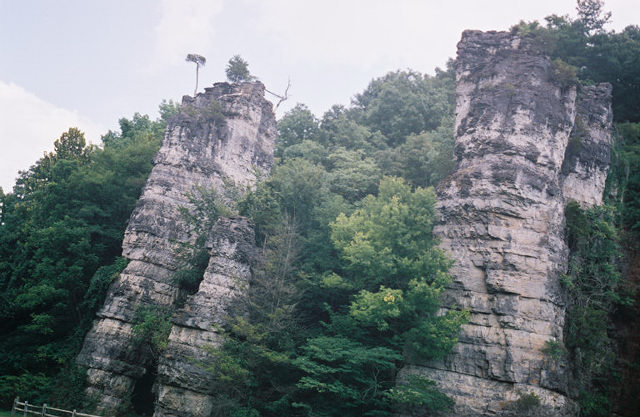|

|
| Natural Chimneys, Mt. Solon Va. |
How Will Future Historians
View George W. Bush?
By David S. Clark, M.Ed.
Historians can make great dinner party guests. We can add facts and analysis to hunches and rumors
that people are curious about. When people disagree on points of religion, politics and race, the historian
is often the one to referee the debate. The War in Iraq , the Geneva Conventions violations, the failure
of the Iraqi government -
So how will future historians critique the Rumsfeld, Cheney and Bush era? The White House since 2001 has misinterpreted or twisted history to suit its needs.
It has confused Iran with Iraq , it has confused the Taliban and Al-Qaeda with international communism, and it has neglected
to study Gamal Abdul Nasser or the situation in the Balkans (formerly communist Yugoslavia ). It has failed
to heed the lessons of basic military history. It has squandered the global support it enjoyed after 9/11 and it has used
Colin Powell himself to destroy the post-Vietnam consensus policy called the Powell Doctrine. The Bush administration
failed to heed the lessons of the Roman Republic and the lessons of American foreign imperialism. They ignored lessons learned
from Napoleon, Wellington and even the Third Reich. Historians, like other early critics, can say 'we told
you so, America' because we knew THEN what is clear NOW. First, Iran and Iraq . Apparently the neoconservatives wanted to turn the clock back to the days before Jimmy Carter
“lost  Iran . The Shah of Iran was a solid western ally, taking about $15
billion dollars in military aid from the US in the 1970s. When Iran fell to the student¯ forces of the
Ayatollah Khomeini in late 1978, the US lost a grand chess piece. After 9/11 with Saddam Hussein as a poster
boy for bad behavior, Wolfowitz, Perle, Cheney and Rumsfeld saw the opportunity to regain something similar. Rather than invade
Iran itself, nearby Iraq became the coveted new chess piece. American overseas adventures could be sold to the public via
fear. Colin Powell went to the United Nations (like Adlai Stevenson) and presented aerial photos of trucks and warehouses.
He did not know it at the time, but he was simultaneously destroying his own reputation, the resilience of the post-Vietnam
War Powell Doctrine;¯ and the memorable successes of JFK during the Cuban Missile Crisis in 1962. With the Iran-like (or Iran Light?) target in place, Bush linked Saddam to Al-Qaeda
and the 9/11 attacks without any historical evidence. Weapons of Mass Destruction (WMDs) were deduced and hysterical claims
were used to browbeat the U.N. and Congress to authorize the use of force falsely (mushroom clouds and long range missiles
were mentioned by the President and Secretary of State). The Secretary of Defense then over-ruled his own chiefs of staff
and used only one third of the necessary ground troops to secure Iraq . Any first semester Military History
101 class will teach the necessity of large numbers of infantry troops being necessary after initial artillery barrages.
Mr. Rumsfeld joined us in watching the shock and awe¯ bombardment of Baghdad on CNN, but he put fewer than 200,000
troops on the ground to secure the large Middle Eastern target country. Mission Accomplished, as¯ the signs said, but the
reality was that the one man, Donald Rumsfeld, had made a colossal strategic error, and the U.S. would never secure the ground
he had bombed and then weakly invaded. His new super-high-tech army was overloaded with batteries and lacked
body armor, and the infantry simply could not secure and hold Iraqi territory rapidly enough. Major and simple historical
conclusions were ignored; the lessons of Napoleon, Wellington , Vietnam , D-Day and the first Gulf War were lost.
More major strategic errors mounted up in the years following the poorly planned invasion. Baathists
were purged and Sunnis generally ostracized in the new Iraq
State Department diplomats who knew the symbolic power of Baathism to the area were ignored. Many
Iraqi families tolerated Baathism under Saddam Hussein because it was the party of Egypt's charismatic Gamal Abdul Nasser.
Nasser had invented the secular, authoritarian nation in the Middle East , and Saddam Hussein and Moamar Qadddafi stayed
in power because of the powerful ability of these Nasserite lieutenants to hold together religiously divided regions under
firm Baathist nationalism. Bush and his Cabinet misread or ignored all of this history. They failed to
recall the crisis of Yugoslavia after Tito, the strongman, fell. They had no inkling that a state bundled
together from old colonial provinces could fall apart if the strong man was toppled. The lessons of Serbia , Bosnia and Kosovo
were lost. Mosul , Basra and Baghdad provinces were cobbled into state called Iraq only after World War
One after the Turkish Empire collapsed, so the similarities between the Balkan crisis and Iraq should have been obvious. They
failed on their own terms. When the Bush administration ventured into global adventurism and 'pre-emptive'¯ war
on false grounds, they failed to even secure the new turf. Bush and Cheney in their panic to react to the
hated reigns of Jimmy Carter and Bill Clinton, built secret torture prisons (which were poorly run, with guards emailing pictures
of naked piles of captives to their friends), they 'legalized'¯ domestic wire-tapping and data mining, they got caught kidnapping
people in Europe (extraordinary renditions?) and generally made our diplomatic situation in the world much harder while squandering
almost all the goodwill the U.S. enjoyed.
When G.W. Bush pushed into his neo-imperial
conquest of Iraq , he crossed the Rubicon. When Julius Ceasar crossed the Rubicon River he brought autocratic executive imperial
powers to Rome , and ended Rome's long tradition of being a representative republic.
Other historians
point to avoidable mistakes in Iraq based on our historical knowledge of race, class, gender and religion. Hyper-masculine
and self-defeating, the Bush imperialist executive probably does not see its adventure in Iraq as a generational issue.
Historians who know about the post-Civil War generation drumming up the Spanish American War, they can see that eagerness
to be tough like Daddy's generation¯ runs through this group, too. Ignorance and militant xenophobia along
race, social class, religious and cultural lines are easily seen in the United States's occupation of Iraq today.
The secrecy will not stop history, and people will tell the tale of the Bush years. Corruption,
incompetence, waste, Richard Cheney's own Halliburton and its subsidiary Kellogg, Brown and Root squandering vast fortunes
--- this was all historically predictable from the Neo-Imperial experiences in Vietnam and other post-colonial wars. The ignorance
of Arabic, the ignorance of Sunni, Shia and Kurd conflicts, the ignorance of basic military artillery and infantry relationships,
all these factors put the US in today's embarrassing position. Neo-conservative ideology and silly reaction
trumped planning, research and prudence. We tried to export democracy at the point of a gun and we failed.
The sole superpower is bogged down in Babylon , and the U.S. has gained nothing while billions of dollars and thousands
of lives are lost. The failure to think about history makes the counter-productive Bush crew into a probable punching bag
for moderate, liberal and conservative historians well into the future.
by David Shanet Clark, M.Ed.
|

"Natural Chimneys"
Augusta County Virginia
35mm
1959 Agfa 2004
Photo by Shanet Clark
|